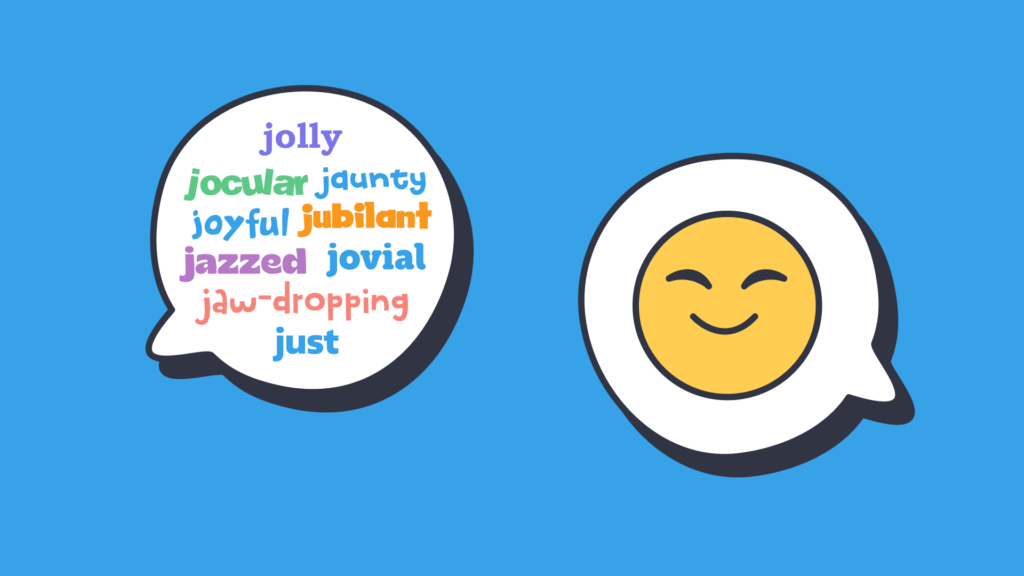Positive words that start with J: A vocabulary guide for students
In this guide
- Why positive vocabulary matters in student learning
- List of positive words that start with J (with definitions and examples)
- Fun activities to help students use new vocabulary in context
- Writing prompts and games to help students to learn positive words
- Encouraging a culture of positivity through vocabulary building
Why positive vocabulary matters in student learning

We all know about the importance of creating a positive learning environment in our classrooms. You probably have the motivational posters, the reward charts and stickers, maybe the marble jar.
Did you know that the vocabulary that you use in the classroom can have a significant impact on student outcomes? In fact, studies have shown that the use of positive language can strengthen areas of the frontal lobe, an area responsible for cognition and learning!
You have also worked really hard to develop positive relationships with each and every one of your students, getting to know their needs, interests and their talents!
With this in mind, we can see the importance of using positive language in the classroom, and encouraging our students to use positive language too! By doing so, we can hope to create a learning environment where students and adults alike are happy, healthy, and ready to learn!
List of positive words that start with J (with definitions and examples)
Here is a list of cheerful and positive words that start with a J:
Joyful
- Showing or feeling great happiness.
- “The lamb gave a joyful leap over the buttercups in the field.”
Jubilant
- Extremely joyful or happy, often in celebration.
- “The children were jubilant when the tests were over!”
Jolly
- Somebody who shows good humour often, a person who is happy and fun.
- “The man had a smiling, jolly face.”
Jaunty
- Cheerful, self-confident and lively.
- “The substitute teacher walked into the classroom with a smile on his face and a jaunty demeanour.”
Jovial
- Friendly and cheerful.
- “The headteacher is always jovial, she walks around the school with a smile on her face, waving at the children.”
Jazzed
- Very enthusiastic and excited about something.
- “The girls were jazzed about the dance competition!”
Just
- Fair, reasonable, and truthful.
- “The teacher was just, he treated everybody fairly.”
Jaw-dropping
- Amazing or impressive.
- “The cliff diver jumped from a jaw-dropping height!”
Jocular
- A person who enjoys joking, humor and being playful.
- “She was in a jocular mood, entering the room with a grin.”

Fun activities to help students use new vocabulary in context
It’s one thing to teach your students new positive words that start with a J, it’s another to try to get them to use them in context!
Here are some fun ideas and activities that you can implement in your classroom to encourage your students to use more positive language in their work and in their everyday lives:
J word of the day
When the students arrive in the morning, direct their attention to a poster where you can display a different positive ‘J’ word each day!
Discuss the definition of that word with your class, come up with some example sentences together, and then encourage your students to try to use that word throughout the day.
Pretty soon, they are sure to be excited and bound through your classroom door to find out what the new word of the day is!
As time goes on, or perhaps with older students, you could put a student in charge of choosing a word of the day; they can even lead the discussion about its definition and share examples of using the word in a sentence with their peers. In my experience, students THRIVE when given additional responsibilities in the classroom.
Word detective
Each day, pick a student in secret, so that nobody else in the class knows who you have picked.
That student’s task throughout the day is to listen to their peers, and take note of when anybody uses a positive word. At the end of the day, the students on the detectives’ ist should be celebrated.
If you have time, ask them to share the positive vocabulary they were caught using.
Celebrating positive language and vocabulary like this is sure to encourage all students in your class to think about the words they are using, thereby creating a more positive atmosphere in your whole school!
Role play
To help your students grasp the meaning of new vocabulary, task them with acting out a role play to explore the definition of a new word. For example, they could role play being a ‘jubilant’ fan at a football match, or a ‘just’ judge in a courtroom.
Students could then perform their role play for their peers, and the audience could try to guess which word the role play is centered around!
I love to get the audience involved in a more active way when doing role play, and this is a great way to ensure they are all engaged and thinking about their learning!
Positive word journal
Each morning, have a student pick out a positive word from a jar, then, as a morning activity, the class could create a journal page all about that positive word! They could include definitions, examples of the word in a sentence, illustrations to depict the word, and even a list of synonyms!
This can be a really creative way to engage your students in exploring new vocabulary and it’s also a calm and mindful way to start your day.
Writing prompts and games to help students to learn positive words
Here are some more ideas to help you to implement more positive vocabulary and language into your classroom:
Writing prompts
A great way to encourage your students to use a variety of positive vocabulary in their writing is to give them prompts! This can also unlock their creativity and offers our students a chance to take the writing where they want from just one small prompt.
Some writing prompt examples, which I have found to be successful are:
- Write about a time you felt joyful.
- Create a jolly character for your story.
- Describe a person who is just.
- Explain what jovial means to you.
For older students, this might be all the prompt they need.
For younger students, or perhaps those who are less confident writers, you could use imagery to help them along.
- Provide an image of a jolly character and ask students to label it.
- Or, provide a picture of a courtroom and ask students to describe and write keywords for the judge.
These types of writing prompts can help your students to put pen to paper, which can sometimes be the biggest hurdle!
If you would like to be a bit more active in your learning, playing games can be a fantastic way to incorporate positive language and vocabulary.
Sometimes, your students don’t even realize they are ‘learning’ because they’re having too much fun!
Vocabulary Bingo
This game is a great way to help your students to remember and recall definitions of words.
- Give them each a bingo board showing a number of positive words that start with a ‘j’.
- Then, read out the definitions of the words, keeping track of which words you have used.
- The students should place a counter over a word on their board if they hear the definition for it.
The winner is the first student to cover all of their words!
Vocabulary relay
I love an active game, and this is one of my favorites that can be adapted to any lesson!
In this instance, take your students outside (or into a sports hall) and place them into teams at one end, behind their ‘home’ hoop.
At the other end, place a hoop, and a bunch of positive words that begin with j for each team.
Students should then take it in turns to run and get a word and bring it back to their team,where they need to explain the definition.
If they get it right, they keep the word and the next person runs, if they don’t get the definition, they don’t get to keep the word.
The winning team is the one that has the most words in their ‘home’ hoop when all the words at the far end have been used up!

Encouraging a culture of positivity through vocabulary building
Using positive language in the classroom can have so many lasting benefits for you and your students academically, but also for the mental health and wellbeing of your students. There are some daily practices that you can incorporate into your classroom that don’t take up a lot of precious time, but that can encourage a culture of positivity:
Celebrations
When your students use positive language, whether that’s in their writing, or in their day to day talk, celebrate them!
Set aside some time at the end of each day to celebrate these students.
Positivity morning meeting
Each morning, choose a positive word and incorporate it into your morning meeting with your class. Use the word, teach them the meaning, and encourage its use throughout the day.
Positivity jar
In your desk, have a jar and some slips of paper.
Encourage students to write down positive things they see and hear and put them in the jar.
At the end of each week or each term, read every note in the jar. This will honestly fill you and your students with joy!
Introducing and encouraging the use of positive language can give your students the tools they need to express themselves in a kindly, friendly and uplifting manner. By celebrating this, you are doing your best to create a positive learning environment, in which all students can be happy and thriving.

Ruth Litchfield
briefcase iconEducator & Education Content Creator
Ruth is an experienced primary school educator of over a decade, and an Educational Content Creator. She specialises in creating fun and engaging activities that require minimal resources and cover multiple curriculum areas.
Other posts
Want more content like this?
Subscribe for blog updates, monthly video releases, trending topics, and exclusive content delivered straight to your inbox.













